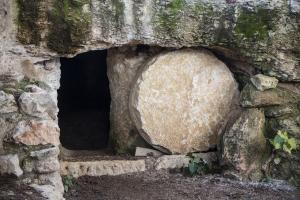We don’t like to admit it, but the demands of love are changeable. Different situations and different people call for different responses. This is obvious, but it’s also challenging. Love requires us to live with uncertainty and ambiguity. We don’t always know the right things to do or the right ways to love. It is so much easier to think of our lives in terms of rules to follow and obligations to fulfill.
This Sunday’s readings are about obligations, but they tell us something strange.
In the first reading, Elijah calls upon Elisha to follow him. Elisha begs to say goodbye to his parents first, and is rebuffed. Elijah says no. The time to follow is now. In this story, obligations are overpowered by the call to serve God.
In an apparent echo of the first reading, the gospel presents us with a man who wants to follow Jesus, but needs to bury his parents first.
Jesus’s answer is shocking: “Let the dead bury their dead.” What is Jesus about? Can he really mean to tell this man that it’s no big deal if his parents remain unburied? Is Jesus really so unnatural as to spurn someone for this request?
If we look at the man’s request in the context of the larger story of Jesus’s life, however, something strange emerges. In every other story about Jesus and death, we hear a different request. Spare my son. Spare my servant. Save my mother-in-law. Raise my daughter from the dead.
Faced with the death of Lazarus, Jesus himself weeps.
Upon meeting Jesus, a man who is famous for his miracles, this man’s request is that Jesus wait while he buries his parents. There is something chilling about this. He is not asking for the restoration of his loved ones. He is not asking for a miracle. He’s just asking Jesus to wait while he completes his obligation.
Something is clearly broken here.
Jesus’s reply remains mystifying. Is he throwing this man’s lack of attachment back in his face? Is he trying to shock him into remembering love, and not mere obligation?
I’m not sure.
Jesus’s response shocks us because He seems to be absolving this man of his obligation. He is placing the man’s obligations elsewhere.
This feels like a moment when God’s omniscience about this man’s life runs up against the limits of our knowledge, and against the limits of storytelling. This is the story of Jesus, not the story of this character. We don’t know his backstory.
What we do know is that abuse and hatred are just as likely to occur within families as outside of them. We also know that things don’t have to get as far as abuse for there to be rifts within families that are difficult to heal. Jesus may be rebuking this man, or he may be giving him permission to move beyond his obligations, to leave home and search for healing.
Every other time that Jesus confronts death in the Gospels, there is restoration. Jesus responds to death by restoring lost loved ones and lost relationships. This encounter is unsettling to us, but perhaps restoration is happening here in a way we do not see. We can hope that, in the story of this man’s life, this encounter with Jesus returns something to him that had been lost.
Image courtesy of Pixabay













